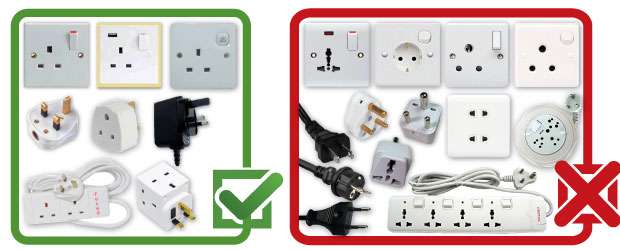Reply To:
Name - Reply Comment

 Electricity is a vital aspect in human life. It has now become part and parcel of our day-to-day lives and one cannot think of a world without electricity. Almost all the devices at homes, businesses and industries are operating because of electricity. As electricity is very useful to our lives, we have to be cautious of the accidents caused when using electricity.
Electricity is a vital aspect in human life. It has now become part and parcel of our day-to-day lives and one cannot think of a world without electricity. Almost all the devices at homes, businesses and industries are operating because of electricity. As electricity is very useful to our lives, we have to be cautious of the accidents caused when using electricity.
There are over 60 types of different plugs used with electrical equipment in Sri Lanka. The three most common socket types used in Sri Lanka are 15A- Round Socket, 5A round Socket and 13A square socket.
The standard was finalised through a wide public consultation process conducted over a period of one year
In plugging these different plug-tops to socket outlets that don’t match, people are exposed to unsafe practices like the following:
Due to these unsafe practices, the people are exposed to more electric related accidents and also see their properties being damaged due to fires. Concerns were raised on the grounds that Sri Lanka should make citizens use accepted methods when using plugs and sockets.
The Public Utilities Commission of Sri Lanka (PUCSL) introduced a new national standard in 2016 for plugs and sockets.
This single standard, proposed by Prime Minister Ranil Wickremesinghe in his capacity as the Minister of National Policies and Economic Affairs, received Cabinet approval on 16 August in 2016.
The Commission decided that the Type G-plug and socket outlet, widely known as the 13 Ampere plug and socket outlet, commonly referred to as the ‘Square Pin’ plug and socket, should be viewed as a product which which meets the national standard.
The standard was finalised through a wide public consultation process conducted over a period of one year, during which the general public, industrialists, manufacturers, appliance retailers, energy sector experts, state regulatory and standards institutions and other stakeholders significantly contributed to the decision making.
Accordingly, the importing and manufacturing of non-standard items were banned from 16th August 2017 and the selling of non-standard items was to be banned from 16th August 2018. However, the PUCSL extended the ban on selling non-standard items until December 31, this year.
PUCSL Assistant Director S. Krishananth told the Daily Mirror that it had to extend the ban on selling due to the concerns raised by the local entrepreneurs dealing with plugs and sockets.
“The decision to impose a standardisation on plugs and sockets was taken with the aim of uplifting the safety of electricity consumers. The standard will apply to the electrical appliances as well.” Krishananth said.
He added that the new set of standards issued under SLS 734, specifies requirements for 13A fused plugs having insulating sleeves on line and neutral pins and 13A shuttered socket-outlets for household, commercial and light industrial purposes, with particular reference to safety during normal use.
The importing and manufacturing of non-standard items were banned from 16th August 2017 and the selling of non-standard items was to be banned from 16th August 2018
According to the new standards, only the equipment with type G (13 A square) plug-tops and sockets are permitted for import, produce and for sale.
Plugging equipment with 5A plug to a 13A square plug or wise versa as multi plugs are banned.
With the new standard, 13A-5A and 5A-13A one to one converters are produced and released to the market.
The wiring of new installations, the addition of circuits to existing installations or complete re-wiring of existing installation, should be carried out with 2.5 mm 2 (7/0.67 mm Cu) and must be compatible with type G-13A socket outlets.
The Department of Import and Export Control recently gazetted regulations with regard to importing standardised plugs and socket outlets to Sri Lanka as a measure of implementing the single standard for plugs and socket outlets in Sri Lanka.
PUCSL has decided to create an enabling environment, issue the necessary regulations and facilitate the participation of other regulatory agencies to ensure that Sri Lanka systematically moves to using one type of plugs and socket outlets.
Although the importation and manufacturing were banned earlier, the ban will be fully effective from January 1, 2019. The ban is effective on sales as well.
The decision to impose a standardisation on plugs and sockets was taken with the aim of uplifting the safety of electricity consumers
- PUCSL Assistant Director S. Krishananth
PUCSAL Assistant Director said that there was no need for people to replace the existing 5A or 15 A round pin sockets and added if one day it happened to be replaced by an existing 5A socket, they should buy a square socket.
The transition to the type G-standard plug and socket should not require any premises to be re-wired purely for the purpose of accommodating the new standard, and that the existing wiring may remain until the end of its lifespan,” Krishananth added.
Electricity users adopt a variety of methods and devices, most of which are unsafe and cause the connection to be unreliable
Electricity users adopt a variety of methods and devices, most of which are unsafe and cause the connection to be unreliable.
There have been as many as 95 electrocutions in 2015, up from 76 in 2013 and 73 in 2014. The use of substandard plugs, sockets, electrical accessories, adaptors and extension cords are some of the main causes of electrocutions and fires.
In conclusion, it is noteworthy that the PUCSAL has taken the initiative to ban the non-standard plugs and sockets considering the fact that the general public are vulnerable to electricity related accidents due to the lack of concerns over electrical materials.